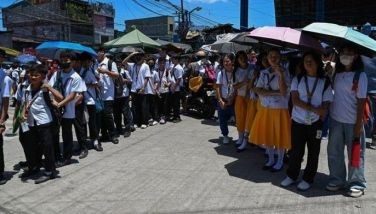75% of Noy reforms completed, but…
MANILA, Philippines – Agribusiness, infrastructure, creative industries, telecommunications and mining should be given greater attention by the government as part of its continuing reform activities, foreign business groups in the Philippines said yesterday.
The Joint Foreign Chambers (JFC), the largest coalition of foreign investors in the Philippines, made the assessment based on recommendations from local and foreign groups originally published in 2010 in Arangkada Philippines.
The JFC said it was happy to report that nearly three fourths of the reforms pushed by business and investors groups in 2010 have been addressed by the government as of last year.
“The public sector is the enabler of job growth, while the private sector is the engine. The two must work in parallel for inclusive growth and job creation,” the JFC said.
“The private sector is doing its share and is ready to do more to improve inclusive growth through investing. Various firms generously support a wide range of socially responsible and economically oriented activities, especially in education, health, housing and disaster relief and recovery,” it added.
The JFC lauded the national government for major improvements in the Philippine economy over the past five years but said a number of binding constraints still remain which prevent the country from achieving inclusive growth.
The Arangkada assessment for 2015 showed 74.50 percent or 333 of the 462 recommendations are active and moving, an overall improvement from the 51.44 percent in the first assessment in 2011.
It was a slight improvement from the 74.22 percent posted in last year’s assessment.
“There has been great progress, not enough, but great progress. Philippine economy is doing very well but it can do better,” American Chamber of Commerce of the Philippines senior advisor John Forbes said.
“A lot is continuing to progress. The economy is moving, these recommendations are being put into part but not 100 percent of what we originally suggested in 2010,” he added.
The Arangkada assessment 2015 identified the sectors of business process outsourcing, infrastructure, manufacturing and tourism as having benefited much from policy and economic reforms.
Arangkada Philippines is a major advocacy launched in 2010 by the JFC. It is funded by a $1-million grant from the US Agency for International Development and is administered by the American Chamber of Commerce of the Philippines.
Meanwhile, foreign business groups appeared unimpressed by the business platforms presented by representatives of presidential aspirants at yesterday’s Arangkada Philippines forum. The candidates did not show up and only sent their representatives.
Former finance secretary Gary Teves represented Jejomar Binay, vice presidential candidate Sen. Alan Peter Cayetano showed up for Mayor Rodrigo Duterte, Valenzuela Mayor Rex Gatchalian came for Sen. Grace Poe and Marikina Rep. Romero Quimbo represented Manuel Roxas II. Sen. Miriam Defensor-Santiago had no representative.
“I was not satisfied with the answers the candidates gave as to addressing the vast array of the protectionist restrictions and regulations in the government and other regulatory agencies,” Canadian Chamber of Commerce of the Philippines president Julian Payne said.
“We’ve heard what we wanted to hear. The issues have never changed, they remain the same. What I want to hear is how do we get there,” said Ryan Evangelista, executive director of the Australia-New Zealand Chamber of Commerce in the Philippines.
The issues brought up by the candidates include pursuing economic growth, addressing corruption in the government, improving infrastructure and tax reforms.
“Reforms have begun. What we want to see is a continuation of the reforms done in recent years, even in the previous administration, and build on that. The country has great potential. We have many ideas. What we need is more rapid implementation,” Forbes said.
The foreign chambers of commerce in the country are urging the next administration to initiate bolder measures to steer the Philippine economy to greater progress over the next decade.
“2016 is a crucial year for the Philippine economy. The results of the May elections will serve as an opportunity for newly elected leaders to build on the success of the Aquino administration but at the same time chart a long-term vision that cuts across the typical six-year planning cycle to adopt bolder reforms that will spur inclusive growth,” the Joint Foreign Chambers of the Philippines said.
“For the Philippines to make growth more inclusive, the incoming administration and future leaders should undertake reforms that sustain and increase GDP growth,” it said.
“This will require continued good governance, political will to undertake more structural reforms, better infrastructure, a fair regulatory regime and lower business costs, among others.”
- Latest
- Trending
































